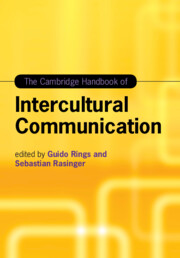Book contents
- The Cambridge Handbook of Intercultural Communication
- Cambridge Handbooks in Language and Linguistics
- The Cambridge Handbook of Intercultural Communication
- Copyright page
- Contents
- Figures
- Tables
- Contributors
- Acknowledgements
- Introduction
- Part I Introducing Intercultural Communication
- Part II Theoretical Approaches
- Part III Methods
- Part IV Application
- Part V Assessment
- Index
- References
Introduction
Published online by Cambridge University Press: 18 February 2020
- The Cambridge Handbook of Intercultural Communication
- Cambridge Handbooks in Language and Linguistics
- The Cambridge Handbook of Intercultural Communication
- Copyright page
- Contents
- Figures
- Tables
- Contributors
- Acknowledgements
- Introduction
- Part I Introducing Intercultural Communication
- Part II Theoretical Approaches
- Part III Methods
- Part IV Application
- Part V Assessment
- Index
- References
Summary
This handbook provides a highly interdisciplinary overview of the wide spectrum of current international research and professional practice in intercultural communication. It discusses key examples of contrastive, interactive, imagological and interlingual approaches as well as the impact of cultural, economic and sociopolitical power hierarchies in cultural encounters, which are essential for contemporary research in critical intercultural communication and postcolonial studies. The handbook explores the spectrum of professional applications of that research and introduces the theories step-by-step using ordinary-language explanations and examples. This makes the theory accessible to readers without specialized training in intercultural communication. The handbook will be a key reference text for advanced undergraduate, postgraduate and research students, lecturers and professionals in intercultural communication and related fields, including cultural studies, linguistics, anthropology, media studies, postcolonial studies, languages, sociology, history and affiliated sub-disciplines.
Keywords
- Type
- Chapter
- Information
- Publisher: Cambridge University PressPrint publication year: 2020



